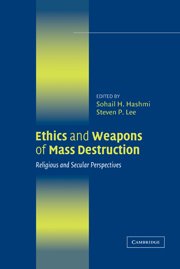Book contents
- Frontmatter
- Contents
- Tables and Figures
- Acknowledgments
- Abbreviations
- Ethics and Weapons of Mass Destruction
- Introduction
- 1 Weapons of Mass Destruction: A Brief Overview
- 2 The International Law Concerning Weapons of Mass Destruction
- PART ONE THE ORIGINAL DEBATE
- PART TWO EXPANDING THE CONVERSATION
- 11 Buddhist Perspectives on Weapons of Mass Destruction
- 12 Buddhism and Weapons of Mass Destruction: An Oxymoron?
- 13 Confucianism and Weapons of Mass Destruction
- 14 “Heaven's Mandate” and the Concept of War in Early Confucianism
- 15 Hinduism and the Ethics of Weapons of Mass Destruction
- 16 Hinduism and Weapons of Mass Destruction: Pacifist, Prudential, and Political
- 17 Islamic Ethics and Weapons of Mass Destruction: An Argument for Nonproliferation
- 18 “Do Not Violate the Limit”: Three Issues in Islamic Thinking on Weapons of Mass Destruction
- 19 Judaism, War, and Weapons of Mass Destruction
- 20 Between the Bible and the Holocaust: Three Sources for Jewish Perspectives on Mass Destruction
- PART THREE CRITICAL PERSPECTIVES
- Contributors
- Index
13 - Confucianism and Weapons of Mass Destruction
Published online by Cambridge University Press: 05 June 2012
- Frontmatter
- Contents
- Tables and Figures
- Acknowledgments
- Abbreviations
- Ethics and Weapons of Mass Destruction
- Introduction
- 1 Weapons of Mass Destruction: A Brief Overview
- 2 The International Law Concerning Weapons of Mass Destruction
- PART ONE THE ORIGINAL DEBATE
- PART TWO EXPANDING THE CONVERSATION
- 11 Buddhist Perspectives on Weapons of Mass Destruction
- 12 Buddhism and Weapons of Mass Destruction: An Oxymoron?
- 13 Confucianism and Weapons of Mass Destruction
- 14 “Heaven's Mandate” and the Concept of War in Early Confucianism
- 15 Hinduism and the Ethics of Weapons of Mass Destruction
- 16 Hinduism and Weapons of Mass Destruction: Pacifist, Prudential, and Political
- 17 Islamic Ethics and Weapons of Mass Destruction: An Argument for Nonproliferation
- 18 “Do Not Violate the Limit”: Three Issues in Islamic Thinking on Weapons of Mass Destruction
- 19 Judaism, War, and Weapons of Mass Destruction
- 20 Between the Bible and the Holocaust: Three Sources for Jewish Perspectives on Mass Destruction
- PART THREE CRITICAL PERSPECTIVES
- Contributors
- Index
Summary
INTRODUCTION: CHINA AS A WORLD TO ITSELF
We are now looking at a civilization – the Chinese – that, for geopolitical reasons, looked at itself for the longest time as the world, a world of culture surrounded by groups of “barbarians.” It dealt with these from a superior position, expecting tributes, while ready to share certain cultural benefits, including the teachings of Confucius. In this sense, China was unaccustomed to regarding itself as an equal partner interacting with others. It was outraged and humiliated by military losses under superior firepower, followed by the imposition by Western powers and Japan of “unequal treaties” during the late nineteenth and early twentieth centuries.
But the Chinese were not arrogant conquerors. On the contrary, their influence was a civilizing one. The Chinese people trace their origin to the mythical Yellow Emperor, to whom is attributed the invention, among many other things, of the compass – which helped to direct his war chariot. He brought order out of chaos after winning a cosmic battle against the arch-villain Zhiyou, the enemy of civilization. It is said that Zhiyou built many kinds of heavy, metal weapons as he prepared for the war with the Yellow Emperor. This myth discloses the cultural disdain for so-called superior weapons and supports the belief that the values of civilization will always triumph. It explains in part the society's preference for civil rather than military virtues, and the consequent inferior status given to the military for most of its known history.
- Type
- Chapter
- Information
- Ethics and Weapons of Mass DestructionReligious and Secular Perspectives, pp. 246 - 269Publisher: Cambridge University PressPrint publication year: 2004
- 11
- Cited by



